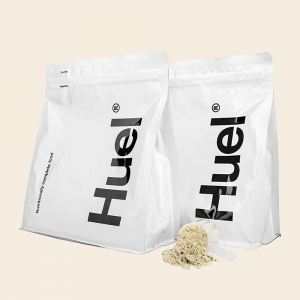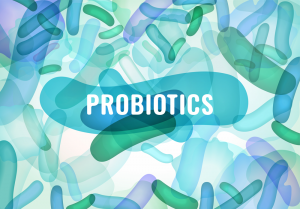Huel (Human + Fuel) is a brand of meal replacement products that are marketed as “nutritionally complete food”, which means that each product contains the essential macro- and micronutrients you need for a complete meal.
However, we can’t assume that a product is healthy just because the formula contains the essentials of what’s needed for a complete meal.
In this Huel review, we’ll evaluate the formula to see if the ingredients are backed by science and if they are used in effective doses for optimal results. We’ll also share if there’s any side effects to look out for, as well as whether or not the formula includes potentially harmful additives.
Lastly, we’ll share Huel reviews from real customers so you can get their take on the taste and texture of this product. Let’s get into it!

What Are The Huel Ingredients?
Each serving size of Huel Powder provides 400 kcal, 29 grams of plant-based protein, 27 vitamins and minerals, fiber, pre- and probiotics, and more. Here’s the details:
Huel Protein
There’s a total of 29 grams (g) of protein in Huel derived from peas and brown rice, making this a suitable source of protein for vegans.
One problem with plant-based proteins is lower bioavailability than animal proteins, such as whey or casein. Nutrient bioavailability is defined as the fraction of a nutrient in a food that is absorbed and utilized.
There’s plenty of research demonstrating that animal-derived protein is more bioavailable than plant-derived protein.
For example, a 2019 trial published in the journal Nutrients demonstrated that whey protein has a higher bioavailability than pea protein. Ultimately, this means that your body absorbs more of the amino acids (the building blocks of protein) in whey protein than in pea protein.
Despite this, the plant-based Huel protein blend could be a good option for vegans, as well as for those with lactose intolerance.
Sunflower Oil
We do not like that this product contains sunflower oil, as sunflower oil contains a high percentage of polyunsaturated fatty acids (PUFAs) — 60% linoleic acid (omega-6 PUFA).
The double bonds in unsaturated fats like PUFAs are highly susceptible to oxidation, which means they are very unstable, especially when exposed to oxygen and heat.
Oxidation generates free radicals, and free radicals lead to accelerated aging, inflammation, and many other health problems.
This is why cooking with PUFA oils is very dangerous, but also just consuming them is harmful because think about it: your body is a pretty hot 98.6 degrees and full of oxygen!
And there’s research to back this up: A publication in the journal Experimental Gerontology states that sunflower oil can cause more DNA damage than olive oil due to its polyunsaturated fats, based on a clinical trial in animals.
MCTs from coconut
We are happy to see that Huel contains medium-chain triglycerides (MCTs) derived from coconut. MCTs are absorbed and metabolized in a different way than other fats, offering a rapid and efficient source of energy.
What’s interesting is that on Huel’s website, they actually write about the issue of oxidation (the issue with the PUFAs in sunflower oil that we just described above).
The Huel website states, “As MCTs are saturated fats, they are not oxidized. Oxidation of fats is an issue because it is part of the disease process of cardiovascular disease and some cancers.”
Since the brand acknowledges the problem with oxidation, we have to wonder why they include sunflower oil in their products!
Probiotics
Probiotics are live beneficial bacteria that support the balance of the gut microbiome, aiding in the digestion and absorption of nutrients. They can contribute to a healthy gut environment, potentially alleviating issues such as bloating, gas, and irregular bowel movements.
The probiotic strain in Huel is Bacillus Coagulans MTCC 5856, which is the same strain used in the popular supplement ProbioSlim (read our full ProbioSlim Review here).
Bacillus Coagulans MTCC 5856 has been shown in studies to promote gut health.
For instance, a 2023 publication in the journal Medicine states, “B coagulans strains can also produce short-chain fatty acids, improve the intestinal environment, promote healthy bowel movement, and enhance the health of gut cells.”
The journal continues to report on the benefits of this strain by saying, “In this study, B coagulans MTCC5856 showed promising results by dramatically lowering gas, bloating, and flatus related symptoms in patients with functional bloating who did not have other serious gastrointestinal diseases.”
Thus, if you have gas, bloating, or just want to promote healthy bowel movements, this probiotic in the Huel formula may benefit you.

Fiber
The sources of fiber in Huel include oats and flaxseed, with one serving of Huel Powder providing 6 grams (g) of fiber according to the Nutrition Facts label.
Dietary fiber is important for promoting digestive health, supporting sustained energy levels, and contributing to a feeling of fullness.
There’s even research, such as a 2019 study published in The Journal of Nutrition, that demonstrates how fiber intake is associated with weight loss.
Plus, these fiber sources are considered to be prebiotics, which means they serve as nourishment for the beneficial bacteria in the gut.
Acerola Cherry and Kombucha Tea Powder
We like that the brand recently added these whole food ingredients to the Huel formula. Acerola cherry is an excellent source of vitamin C, while kombucha provides an ample amount of vitamin B12 and other nutrients.
Unfortunately, it’s hard to tell if these ingredients are used at effective doses because the brand does not list the amount on the label.
Vitamin and Minerals
Huel includes all the 27 essential vitamins and minerals, but one serving does not provide 100% of the amount you need each day.
For example, one serving of Huel Powder contains 0.5 mg of vitamin B6, which is 21% Daily Value (DV). You would have to consume five servings to get 2.5 mg of vitamin B6, which is 100% DV.
What’s The Difference Between Huel Powder and Huel Black Edition?
Huel Black Edition is slightly more calorie-dense than Huel Powder, with a 90g serving providing 400 kcal. Oats have been replaced with a smaller amount of tapioca starch, so the Huel Black Edition formula is naturally gluten free.
What Are The Benefits of Huel?
The brand claims that Huel provides a whopping 154 health benefits. So is this true? Below we’ll summarize the main benefits you may notice from Huel:
Reduced Fatigue
There’s key nutrients included in the Huel formula to prevent tiredness and fatigue, such as vitamin B12, magnesium, iron, and niacin (vitamin B3), just to name a few.
Immune Support
Some of the important nutrients that your immune system needs to function optimally include vitamin D, folate (vitamin B9), and vitamin C. Each of these nutrients can be found in the Huel meal replacement shakes.
Skin, Nails & Hair Improvements
Huel contains selenium to support hair and nail integrity, zinc for healthy skin, hair and nails, and vitamin C to aid in collagen production.
We wish the formula contained collagen since this is one of the best ingredients for promoting youthful skin, strong nails, and healthy hair. You can read more about the benefits of collagen in our Vital Proteins Collagen Peptides Review and Native Path Collagen Review.
Muscle Function
The high protein in Huel helps with muscle growth, while minerals like magnesium and potassium help to support normal muscle function. Most people don’t get enough of these minerals, so it’s great that they are included in this formula.
Digestive Support
As mentioned above, the probiotic in Huel has been shown to promote digestive health and a balanced gut microbiome.
Furthermore, the calcium present in this formula plays a vital role in facilitating the optimal functioning of crucial digestive enzymes, ensuring the efficient breakdown and absorption of nutrients during the digestive process. Without calcium, these enzymes may experience decreased efficiency.
What Are The Side Effects of Huel?
We were disappointed to see that several of the Huel flavored powders contain the artificial sweetener sucralose, which has been linked to numerous negative health effects.
Some studies suggest that sucralose may negatively influence the composition and activity of gut microbiome.
Moreover, some studies have proposed that artificial sweeteners, like sucralose, might interfere with the body’s ability to regulate calorie intake, potentially leading to increased cravings for sweet foods and overall calorie consumption.
Other questionable additives in Huel Black Edition include “natural flavors”, maltodextrin, xanthan gum, and cornstarch.
How to Use Huel?
Simply add water to your shaker, then add Huel Powder, and shake!
Where to Buy Huel?
Huel products are sold on the brand’s website (huel.com), as well as on Amazon.com.
How Much is Huel?
On the brand’s website Huel Powder starts at $37.50 USD with a subscription ($2.21 per meal) while Huel Black Edition starts $42.50 with a subscription ($2.50 per meal).
On Amazon.com, Huel Black Edition costs $59.99 for the same amount.
Our Verdict
Overall, we like the idea behind the Huel products, however, there’s just too many potentially harmful additives in the formulations for us to recommend this brand.
Pros
- Many positive Huel reviews (overall rating 4.3 out of 5 stars)
- 30-day money back guarantee
- Convenient
- High protein (29 grams per serving)
- Suitable for vegans
Cons
- Plant-based protein is less bioavailable than animal-derived protein
- Sunflower oil contains high concentration of PUFA
- Several of the Huel products contain the artificial sweetener sucralose
- Other questionable additives include “natural flavors”, maltodextrin, xanthan gum, and cornstarch
- Some reviews mention issues with packaging
What Are Some Alternatives to Huel?
If you’re looking for an alternative to Huel, you may have come across KaChava, another very popular plant-based meal replacement shake.
You can read our full KaChava Review here. While KaChava could be a good option for vegans and those with lactose intolerance, there were a few questionable ingredients in the formula such as gums and raw maca.
Due to the better bioavailability, we would recommend a high-quality whey protein meal replacement, such as Designer Whey.
References:
Nutrients. 2019 Nov 1;11(11):2613.
J Nutr 2019 Oct 1;149(10):1742-1748.
Exp Gerontol. 2004 Aug;39(8):1189-98.
Medicine (Baltimore). 2023 Mar 3; 102(9): e33109.



